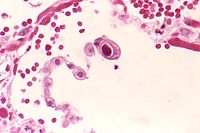
Photo from wikipedia
Human cytomegalovirus (HCMV) reactivation remains a relevant complication after hematopoietic stem cell transplantation (HSCT) despite the great progress made in prophylaxis and treatment. Adaptive Natural Killer (NK) cells undergo a… Click to show full abstract
Human cytomegalovirus (HCMV) reactivation remains a relevant complication after hematopoietic stem cell transplantation (HSCT) despite the great progress made in prophylaxis and treatment. Adaptive Natural Killer (NK) cells undergo a persistent reconfiguration in response to HCMV reactivation however, the exact role of adaptive NK cells in HCMV surveillance is currently unknown. We studied the relationship between HCMV reactivation and adaptive NK cells in 70 patients monitored weekly until day +100 after HSCT. Absolute cell counts of adaptive NK cells increased significantly after resolution of HCMV-reactivation compared to patients without reactivation. Patients with HCMV-reactivation had an early reconstitution of adaptive NK cells (“Responders”) and had mainly a single reactivation (75% Responders vs 48% Non-Responders). Adaptive NK cells eliminated HCMV-infected human foreskin fibroblasts (HFF) in vitro and recruited T cells in an in vitro transwell migration assay. An extensive cytokine/chemokine panel demonstrated strongly increased secretion of CXCL10/IP-10, IFN-α, IL-1α, IL-1β, IL-5, IL-7 and CCL4. Thus, adaptive NK cells may control viral spread and T cell expansion and survival during HCMV-reactivation. Taken together, we have demonstrated the potential of adaptive NK cells in the control of HCMV reactivation both by direct cytotoxicity and by recruitment of other immune cells. Human cytomegalovirus (HCMV) is a β-herpes virus that causes life-long infection as a latent virus in its host. Its prevalence depends on socioeconomic geographical factors and can affect 50–90% of the population depending on these factors. HCMV infection is usually asymptomatic in healthy individuals. However, in patients lacking proper immune responses, such as following hematopoietic stem cell transplant (HSCT), HCMV can reactivate and increase the mortality and morbidity rates in these patients. We set to investigate the role of a population of innate cells, the adaptive Natural Killer (NK) cells, in the response to HCMV reactivation after HSCT. Our findings revealed that adaptive NK cells are modulated in response to HCMV reactivation after HSCT. Furthermore, in addition to their ability to eliminate HCMV-infected target cells after in vitro expansion, we have also shown that adaptive NK cells recruit T cells in response to co-culture with HCMV-infected target cells and identified secreted factors possibly involved in this recruitment.
Journal Title: Bone Marrow Transplantation
Year Published: 2022
Link to full text (if available)
Share on Social Media: Sign Up to like & get
recommendations!